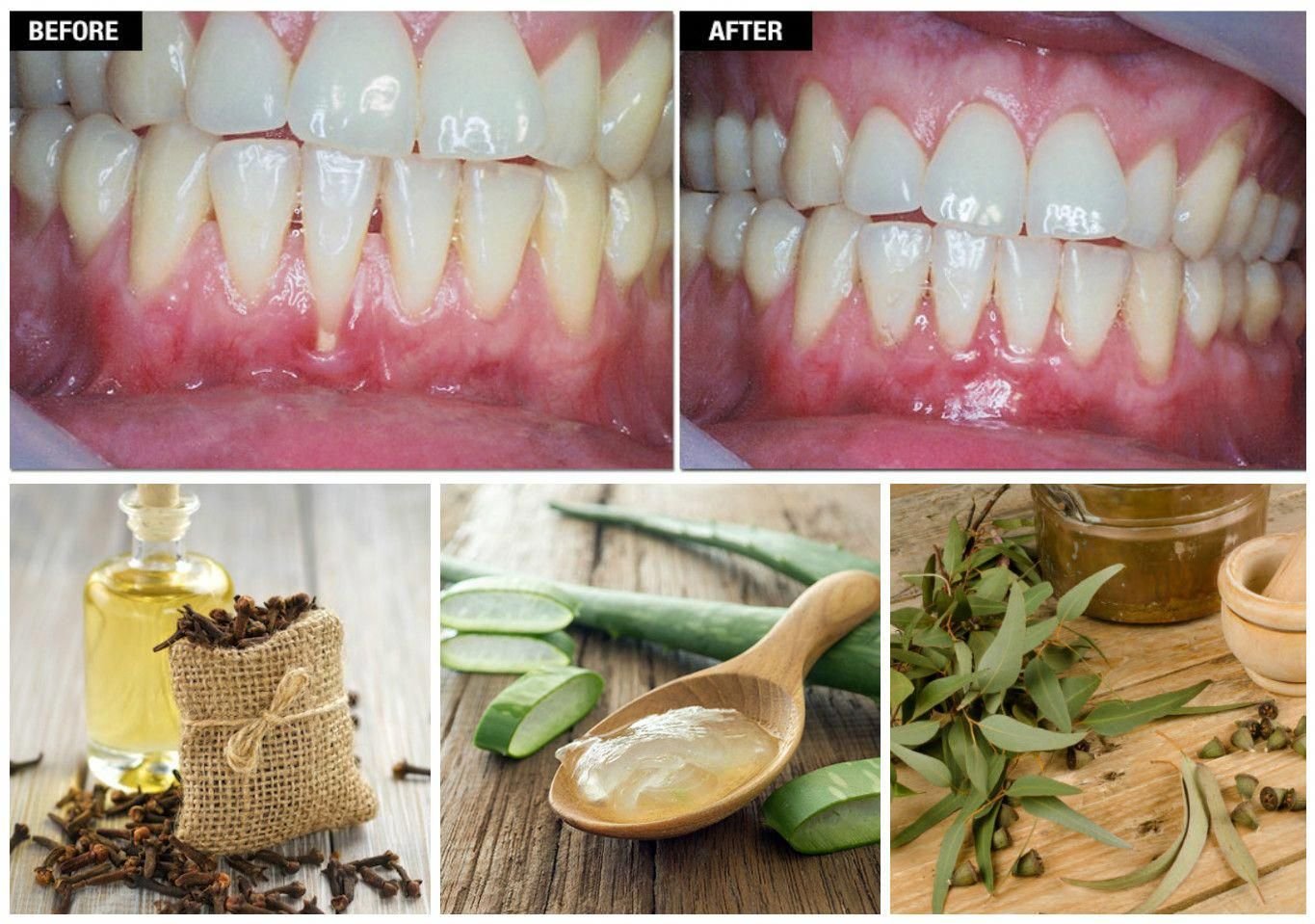Embark on a journey towards relief and recovery with our comprehensive guide to home remedies for gum infection. Experience the power of natural ingredients as we delve into their antibacterial and anti-inflammatory properties, empowering you with practical solutions to alleviate pain, reduce inflammation, and restore oral health.
Key Takeaways:
- Maintain good oral hygiene by brushing, flossing, and rinsing daily.
- Use medicated or natural mouthwash to kill bacteria.
- Consider oil pulling with coconut or sesame oil to reduce infection.
- Apply cold compresses, clove oil, or aloe vera for pain and inflammation.
- Avoid sugary drinks and tobacco to prevent bacteria buildup.
Home Remedies for Gum Infection

Gum infection, also known as gingivitis, is a prevalent dental issue causing discomfort and potential health complications. Fortunately, various home remedies for gum infection offer safe and effective relief.
Natural Antibacterials
- Tea Tree Oil: Possessing strong antimicrobial properties, tea tree oil reduces bacteria buildup, fighting gum infection. Dilute it with water and apply it to the affected area.
- Turmeric: Curcumin, a compound found in turmeric, has anti-inflammatory and antibacterial properties. Integrate it into your toothpaste or prepare a paste with water for topical application.
- Salt Water: Saline solutions draw out infection and reduce inflammation. Gargle or swish with warm salt water several times a day.
Pain Relievers
- Clove Oil: Clove oil is a natural anesthetic, providing temporary pain relief. Apply a diluted form directly to the infected gum.
- Aloe Vera: Aloe vera’s soothing properties alleviate pain and reduce inflammation. Apply its fresh gel or use a mouthwash containing it.
- Cold Compress: Cold therapy constricts blood vessels, reducing swelling and pain. Apply a cold compress or ice pack to the affected area.
Preventive Measures
- Oil Pulling: Swishing oil (such as coconut or sesame oil) in the mouth for 10-15 minutes helps eliminate bacteria and promote gum health.
- Dietary Habits: Avoid sugary drinks and tobacco, as they contribute to bacterial growth.
- Optimal Hygiene: Maintain good oral hygiene by brushing twice daily, flossing regularly, and using medicated mouthwash.
Remember, these home remedies for gum infection provide temporary relief and should not replace professional dental care. If symptoms persist or worsen, consult a dentist for proper diagnosis and treatment.
Do you know that you can treat your faster periods at home? Check out our home remedies for faster periods here.
If you are troubled by gum irritation and don’t have access to a dentist, then click here to check some home remedies for gum irritation.
You can also treat gum pain wisdom tooth at your home. Try these home remedies for gum pain wisdom tooth.
Effective Incorporation of Natural Remedies into Daily Routines
Gum infections can cause discomfort and affect oral health. Incorporating natural remedies into your daily routine can provide relief and support gum health.
Chamomile, Ginger, and Cinnamon Tea
Brew a soothing tea with chamomile, ginger, and cinnamon. Chamomile possesses anti-inflammatory properties to calm the gums, while ginger and cinnamon have antibacterial properties to combat infection.
Aloe Vera
Apply aloe vera gel to the affected area. Its antibacterial, antifungal, and soothing effects can reduce inflammation and pain.
Saline Solution
Rinse your mouth with a saltwater solution made by dissolving salt in warm water. The salt acts as a disinfectant, helping to reduce swelling and remove bacteria.
Sage
Sage is a natural antiseptic herb. Steep sage leaves in hot water to create a mouthwash. Sage’s anti-inflammatory and antimicrobial properties provide relief from gum pain and infection.
Key Takeaways:
- Incorporate natural remedies like chamomile tea, aloe vera, saline solution, and sage into your daily routine.
- Antibacterial and anti-inflammatory properties of these remedies help combat infection and reduce pain.
- Use natural remedies alongside regular dental care for optimal results.
Relevant URL Sources:
- How to Cure Gum Disease Without A Dentist: Do It Yourself
- 7 Natural Remedies for Healthy Gums
Practical Home Remedies for Alleviating Gum Pain and Inflammation

Do sore and inflamed gums make you wince with every bite?
Don’t despair! Before you reach for over-the-counter pain relievers, consider trying these powerful natural remedies that can soothe your pain, reduce inflammation, and promote healing.
Herbal Poultice
Harness the power of nature’s pain relievers like clove powder or Spilanthes. Simply mix either of these with a little water to form a paste. Apply it to the affected area and let it work its magic for up to 30 minutes.
Saltwater Rinse
Fight off infection and reduce inflammation with a simple saltwater rinse. Dissolve a teaspoon of salt in a cup of warm water and rinse your mouth vigorously for 30 seconds. Repeat several times a day.
Homemade Dental Spray
Essential oils like peppermint and tea tree are nature’s germ-fighting duo. Create a homemade dental spray by mixing 2-3 drops of each oil with a cup of distilled water. Spray it into your mouth to freshen breath, soothe pain, and kill bacteria.
Teabags
The tannins in teas like green tea and chamomile have potent anti-inflammatory and antioxidant effects. Steep a teabag in hot water and let it cool. Use it as a mouth rinse or apply the teabag directly to the affected area.
Pain Management
Cold or Hot Compress: Applying a cold or hot compress to the cheek can help reduce inflammation and pain.
Key Takeaways:
- Natural remedies provide temporary relief and support healing.
- Practical Home Remedies for Alleviating Gum Pain and Inflammation include herbal poultice, saltwater rinse, homemade dental spray, and teabags.
- Pain management techniques like compresses are also effective.
- Consult a dentist if symptoms persist or worsen.
Relevant URL Sources:
Promoting Oral Health with Natural Remedies
Combat Gum Infection with Natural Remedies
Gum infection, a common problem, results from bacterial plaque buildup. Thankfully, Promoting Oral Health with Natural Remedies offers a wealth of effective solutions.
Key Takeaways:
- Natural antibacterial remedies like neem extract, tea tree oil, cranberry, and vitamin C combat gum infection.
- Oil pulling, an Ayurvedic practice, effectively removes bacteria.
- Maintaining good oral hygiene through brushing, flossing, and regular dental checkups is essential.
Harnessing Nature’s Power
Neem Extract: This potent antibacterial agent fights infection and reduces inflammation.
Tea Tree Oil: A natural antiseptic, it inhibits bacterial growth and soothes irritation.
Cranberry: Rich in antioxidants, it prevents bacteria from attaching to gum tissue.
Vitamin C: An immune system booster, it aids in tissue repair and gum health maintenance.
Oil Pulling: An Ancient Technique
Oil pulling, a traditional Ayurvedic practice, involves swishing oil in the mouth for 10-15 minutes. It removes bacteria and improves gum health.
Dietary and Lifestyle Modifications
Avoid Sugar and Tobacco: These contributors to bacterial growth should be avoided.
Brush and Floss Regularly: Maintain good oral hygiene to prevent plaque buildup.
Use Medicated Mouthwash: Antibacterial mouthwashes can further reduce plaque and bacteria.
Remember:
While home remedies provide relief, they should not replace professional dental care. If symptoms persist or worsen, consult a dentist promptly.
Relevant URL Sources:
FAQ
Q1: What are the most effective natural remedies for gum infection?
A1: Turmeric paste, aloe vera, chamomile tea, and oil pulling are highly effective natural remedies for gum infection, thanks to their antibacterial and anti-inflammatory properties.
Q2: How often should I use natural remedies for gum infection?
A2: The frequency of use may vary depending on the specific remedy and the severity of the infection. It’s recommended to follow the instructions provided with each remedy or consult with a healthcare practitioner for personalized guidance.
Q3: Can I use over-the-counter medications along with natural remedies?
A3: While some over-the-counter medications can provide pain relief and reduce inflammation, it’s essential to consult with a healthcare professional before using them in conjunction with natural remedies.
Q4: What lifestyle changes can I make to support gum health?
A4: Avoiding sugary drinks, tobacco, and maintaining a healthy diet and regular oral hygiene routine can significantly contribute to gum health and prevent future infections.
Q5: When should I seek professional dental care for gum infection?
A5: If home remedies do not provide relief or the infection worsens, it’s crucial to seek professional dental care. Persistent pain, bleeding, or swelling may indicate a more severe underlying issue that requires medical attention.
- Dora the Explorer Wipe-Off Fun: Safe & Mess-Free Activities for Little Explorers - April 18, 2025
- Does Lemongrass Repel Mosquitoes? Fact vs. Fiction + How to Use It - April 18, 2025
- Do Woodchucks Climb Trees?Fact vs. Fiction - April 18, 2025










